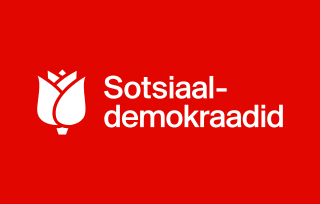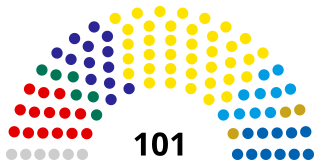 |
|---|
The Estonian Radical Socialist Party (Estonian : Eesti Radikaalsotsialistlik Partei, ERSP) was a political party in Estonia.
 |
|---|
The Estonian Radical Socialist Party (Estonian : Eesti Radikaalsotsialistlik Partei, ERSP) was a political party in Estonia.
The party was founded on 6 May 1917 in Tallinn in order to contest the Estonian Provincial Assembly elections that year. [1] Its initial leaders were Jüri Vilms and Eduard Laaman. [2] The party co-operated closely with the Social Travaillist Party and the two became known as the "Labourites". [3]
The Labourites won 11 of the 62 seats in the Assembly elections, [4] becoming the second-largest faction after the Rural League, and went on to finish second in the 1918 Constituent Assembly elections.
In 1919 the two parties merged to form the Estonian Labour Party. [1]
The Radical Socialist Party was founded as a clearly left-wing party, that supported social equality, democracy, but also liberal economic policies, and had a similar programme to the Russian Trudoviks. [1] Its voters came from the poorer classes and therefore it had a radical approach to the land reform and advocated the separation of church and state and a democratic constitution, which would give more power to the parliament.

Otto August Strandman was an Estonian politician, who served as Prime Minister (1919) and State Elder of Estonia (1929–1931).

The Democrats of the Left was a social-democratic political party in Italy. Positioned on the centre-left, the DS, successor of the Democratic Party of the Left (PDS) and the Italian Communist Party, was formed in 1998 upon the merger of the PDS with several minor parties. A member of The Olive Tree coalition, the DS was successively led by Massimo D'Alema, Walter Veltroni, and Piero Fassino, and merged with Democracy is Freedom – The Daisy and a number of minor centre-left parties to form the Democratic Party in October 2007.

The Social Democratic Party is a centre-left political party in Estonia. It is currently led by Lauri Läänemets. The party was formerly known as the Moderate People's Party. The SDE has been a member of the Party of European Socialists since 16 May 2003 and was a member of the Socialist International from November 1990 to 2017. It is orientated towards the principles of social-democracy, and it supports Estonia's membership in the European Union. From April 2023, the party has been a junior coalition partner in the third Kallas government.

The Riigikogu is the unicameral parliament of Estonia. In addition to approving legislation, the Parliament appoints high officials, including the prime minister and chief justice of the Supreme Court, and elects the president. Among its other tasks, the Riigikogu also ratifies significant foreign treaties that impose military and proprietary obligations and bring about changes in law, as well as approves the budget presented by the government as law, and monitors the executive power.
This article gives an overview of liberalism and centrism in Estonia. It is limited to liberal and centrist parties with substantial support, mainly proved by having had a representation in parliament. The sign ⇒ denotes another party in that scheme. For inclusion in this scheme it is not necessary that the party has labeled itself as a liberal party.

Konstantin Päts was an Estonian statesman and the country's president from 1938 to 1940. Päts was one of the most influential politicians of the independent democratic Republic of Estonia, and during the two decades prior to World War II he also served five times as the country's State Elder. He carried out a self-coup on 12 March 1934. After the 16–17 June 1940 Soviet invasion and occupation of Estonia, Päts remained formally in office for over a month, until he was forced to resign, imprisoned by the new Stalinist regime, and deported to the USSR, where he died in 1956.

Jaan Tõnisson was an Estonian statesman, serving as the Prime Minister of Estonia twice during 1919 to 1920, as State Elder from 1927 to 1928 and in 1933, and as Foreign Minister of Estonia from 1931 to 1932.
The Estonian Social Democratic Workers' Party was a political party in Estonia between 1917 and 1925. The leaders of the party, founded on platforms of patriotism, Estonian independence, and social justice, made a major contribution to the drafting of the first (1920) Constitution of Estonia.

The Estonian United Left Party, informally Left Alliance, is a left-wing political party in Estonia undergoing reformation.
The Estonian Labour Party was a political party in Estonia. It was formed in 1919 by a merger of the Radical Socialist Party and the Social Travaillist Party, and ceased to exist in 1932, when it merged with other centrist parties to form the National Centre Party. It was a member of government coalitions between 1919 and 1925, and again from 1927 until 1931.
The Estonian People's Party was a centre-right political party in Estonia.

The Farmers' Assemblies was a conservative political party in Estonia. Led by Konstantin Päts, it was one of the ruling parties during most of the interwar period.
The Estonian Independent Socialist Workers' Party was a political party in Estonia.
The Estonian Socialist Workers' Party was a political party in Estonia.
The Estonian Socialist Revolutionary Party was a political party in Estonia during the early 20th century.
The Social Travaillist Party was a political party in Estonia.
The Estonian Radical Democratic Party was a political party in Estonia.
The Estonian Democratic Party was a political party in Estonia.
The Democratic Bloc was a political grouping in Estonia.
The political history of Estonia covers the political events and trends in the country throughout its historical period.